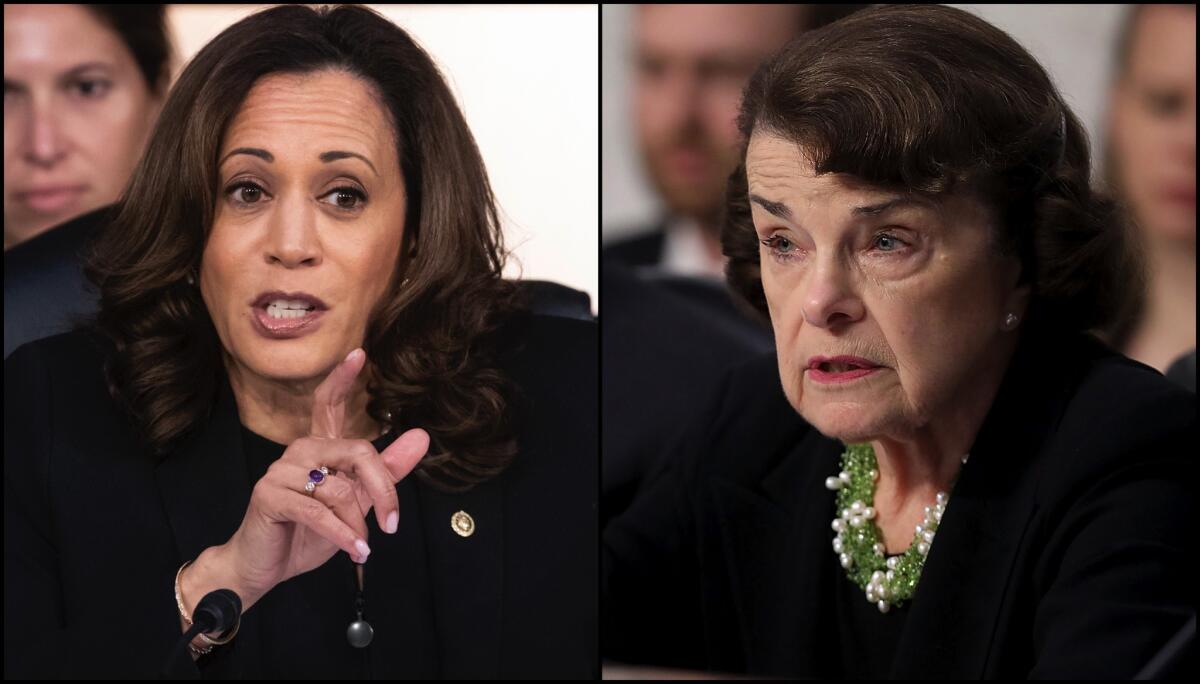Analysis:: Kavanaugh hearings showcase the starkly different political styles of Sens. Feinstein and Harris

- Share via
Reporting from Washington — It was only seven seconds into Supreme Court nominee Brett M. Kavanaugh’s confirmation hearing when Sen. Kamala Harris launched the Democrats’ surprise attack to shut down the proceeding over a lack of access to documents revealing his record.
Besides her relentless cross-examination of President Trump’s nominee, Harris also landed one of the most dramatic moments, when Kavanaugh initially couldn’t answer whether he had discussed the special counsel investigation into Trump with anyone at a law firm that represents Trump’s business — a moment that caught fire on social media.
Sen. Dianne Feinstein, the most senior Democrat on the panel, took a very different tack.
She was the last to join colleagues’ calls to suspend the hearing. She politely pressed Kavanaugh on abortion rights and gun safety in her understated way — one that has sometimes lulled adversaries into a sense of security that leads to revealing moments. She called Kavanaugh’s responses “forthcoming” — a comment that infuriated progressive critics.
The contrasting styles of California’s two Democratic senators were on full display at Kavanaugh’s four-day confirmation hearing that ended Friday, providing a window into each lawmaker’s approach to the Trump era.
Despite stark differences, both seem to have accomplished what they needed to in the high-profile hearing. Feinstein, up for reelection in November, preserved her good-cop persona — popular with undecided voters and moderates — despite pressure from progressives to move to the left. Harris generated national buzz as a provocateur and effective stalwart against the Trump administration ahead of her likely 2020 presidential run.
The generational divide between Feinstein and Harris reflects the one between more staid veteran Democratic leaders in Washington and the firebrand newcomers who want to confront the president. Social media and viral videos didn’t exist for much of Feinstein’s career — and her pragmatic politics weren’t built for it. But the liberal activists who would make up Harris’ base thrive on it — and she’s good at engineering the moments that create a spark.
Feinstein has a long relationship with Senate Judiciary Chairman Charles E. Grassley (R-Iowa), a rapport that lends itself to enacting bipartisan legislation but not obstruction. Harris is new to Washington and eager to make a national name for herself.
During the Kavanaugh hearing, Harris capitalized on the opportunity.
Despite being the last of 10 Democrats to question Kavanaugh — a freshman rank that meant she didn’t get started until after 9 p.m. on the East Coast — Harris’ experience as a prosecutor paid off as she landed blows that circulated on social media and television, such as “The Daily Show,” and resonated with progressives.
One of her most circulated clips was her question on whether there are any laws that govern the male body, a clear reference to abortion restrictions. Kavanaugh appeared puzzled. “I’m not thinking of any right now, senator,” he said.
An aide to Harris said the question — along with queries on race-based admissions, gay rights and abortion access — was part of an effort to underscore the real-world implications of approving Trump’s appointee to the Supreme Court in a hearing that often devolved into legal jargon.
Harris also got widespread praise for her intense questioning on whether Kavanaugh spoke with anyone at Trump’s lawyer’s firm, Kasowitz Benson Torres, about special counsel Robert S. Mueller III’s investigation into possible collusion between Trump’s campaign and Russia in the 2016 election. The query appeared to unnerve Kavanaugh. When Kavanaugh said he couldn’t remember, Harris said, “I think you’re thinking of someone, and you don’t want to tell us,” a remark that prompted murmurs from the audience and drew an interruption from Sen. Mike Lee (R-Utah).
The exchange was one of the newsiest moments of the first day of questioning and had many wondering where Harris was headed. But during a follow-up on the second day of the hearing, Kavanaugh directly answered no, extinguishing any sizzle she generated in her first questions.
Harris said that she had “reliable information” from a source that a conversation took place, but an aide said nothing more would come of it unless the source decided to act.
At the other end of the Democratic side of the dais, Feinstein was far more low-key, at least publicly.
The highest-ranking Democrat on the committee had been pushing back for weeks on Republicans’ refusal to release Kavanaugh’s documents, demanding repeatedly over the last month that the hearings be delayed until Democrats had time to review his complete record. But that’s not what people watching the hearings saw.
All nine of the other Democrats on the committee raucously demanded the hearing come to a close, battling for nearly an hour with Grassley before Feinstein interjected, politely.
“I really regret this, but I think you have to understand the frustration on this side of the aisle,” Feinstein said. “Understand where we’re coming from. It’s not to create a disruption. It’s not to make this a very bad process. It is to say, ‘Majority, give us the time to do our work so that we can have a positive and comprehensive hearing on the man who may well be the deciding vote for many [Americans’] futures.’”
A Feinstein spokeswoman said Friday that after taking the lead for so long, “she wanted her colleagues to have an opportunity to make the case.”
Feinstein went further the next day, rebuking Republicans for restricting the use of so many of the documents, calling it “kind of a crock.”
While Feinstein’s interactions with Kavanaugh were markedly cordial compared to other Democrats’ questioning, she pressed him repeatedly on his stance that assault weapons are “commonly used” and thus can’t be banned under the 2nd Amendment and on whether he would vote to overturn the abortion rights ruling Roe vs. Wade.
Feinstein was 40 when the 1973 decision came down, and she has told stories of college acquaintances who died seeking illegal abortions before the ruling. “I don’t want to go back to those death tolls in this country,” she said.
It prompted some of Kavanaugh’s only personal remarks on the issue.
“I understand the significance on the issue,” he said Wednesday. “I don’t live in a bubble. I live in the real world.” That said, some expect he will vote to restrict abortion rights, if confirmed.
Feinstein didn’t need a national political moment the way Harris does. Feinstein is leading widely in most polls over her general election opponent, Democratic state Sen. Kevin de León, and is widely expected to win reelection to a fifth full term. And despite holding a range of progressive positions, she’s never been a darling of that wing of the party. Embracing the middle of the road tends to be a more comfortable place for her.
At times, Feinstein appeared irritated with the steady string of protesters who interrupted the proceedings, even apologizing to Kavanaugh at one point.
“I’m sorry for the circumstances, but we’ll get through it,” Feinstein said.
The moment enraged some progressives. Brian Fallon, leader of liberal-leaning judicial advocacy group Demand Justice, immediately tweeted that her comment was “ridiculous.” Later that day, he tweeted, “Can Harris be promoted to Ranking Member?”
And De Leon tweeted that “We should be praising the protesters and standing outside with them, not apologizing for their actions. We need a senator from California who will stand up and #RESIST not #ASSIST.”
The former San Francisco mayor may not produce the red meat the progressive wing of the Democratic Party is demanding right now, but that has proven to be one of her strengths as a politician in nearly three decades in Washington.
And Feinstein’s noncombative style is sometimes more effective. It was Feinstein who, in public meetings with Trump earlier this year, prodded the president to promise to support legislation to provide legal status for people brought into the country illegally as children and to ban assault weapons. Trump, however, later backed away from the statements.
More stories from Sarah D. Wire »
More stories from Jennifer Haberkorn »
[email protected] and [email protected]
Follow @sarahdwire on Twitter
Read more about the 55 members of California’s delegation
More to Read
Get the L.A. Times Politics newsletter
Deeply reported insights into legislation, politics and policy from Sacramento, Washington and beyond. In your inbox twice per week.
You may occasionally receive promotional content from the Los Angeles Times.












